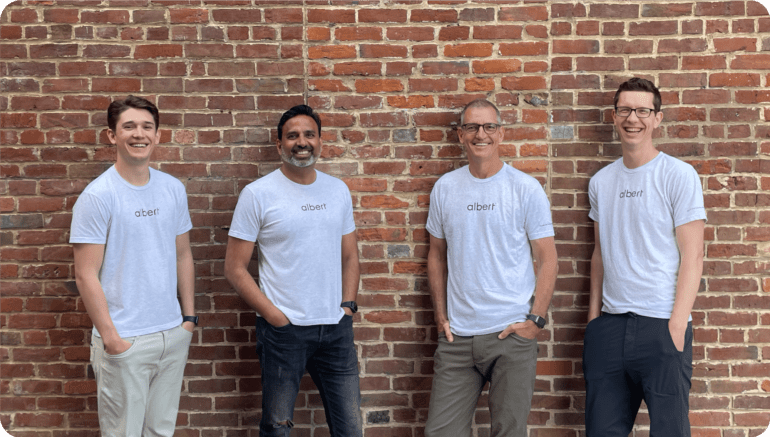TL;DR:
- California-based R&D software developer Albert Invent successfully raised $7.5 million in seed funding led by Index Ventures.
- Albert Invent’s key offering, Albert, is a collaborative digital platform designed to streamline R&D processes in the materials science industry.
- Albert incorporates AI and ML technology for experiment simulations and maintains a database of industry standards and over 50,000 commercially available materials.
- The funding will be used to expand Albert’s digital offering and onboard more chemistry and materials science companies, aiming to strengthen Albert Invent’s influence in the $4.7 trillion chemicals and materials science industry.
- Albert’s advanced features include predictive material simulations, standardized data frameworks, automated material tracking, and an integrated alternative to Microsoft Excel.
- Customers worldwide, including Henkel, 3D Systems, and Applied Molecules, have experienced significant ROI and increased productivity using Albert.
Main AI News:
California-based research and development (R&D) software developer, Albert Invent, has successfully concluded a seed funding round, raising an impressive $7.5 million. The investment was spearheaded by Index Ventures, with participation from Homebrew, F-Prime Capital, and prominent angel investors.
At the heart of Albert Invent’s offerings lies Albert, a cutting-edge, secure, and collaborative digital platform that streamlines the entire R&D process. Albert eliminates the hurdles created by disconnected and fragmented R&D workflows, including challenges associated with Laboratory Information Management Systems (LIMS) and Electronic Lab Notebooks (ELNs).
Albert’s digital platform incorporates state-of-the-art artificial intelligence (AI) and machine learning (ML) technologies to enable advanced experiment simulations. Furthermore, it boasts a vast repository of industry standards and over 50,000 commercially available materials, enhancing its value proposition.
The latest funding infusion will fuel the expansion of Albert Invent’s digital portfolio and facilitate the onboarding of additional chemistry and materials science enterprises. These strategic additions are poised to further solidify the company’s standing within the $4.7 trillion chemicals and materials science industry.
Paris Heymann, a Partner at Index Ventures, praised Albert Invent, stating, “Albert exemplifies the type of software company we seek to back. The platform was developed by a team with deep industry expertise, built specifically for customers who are digitally transforming their R&D efforts and developing the lab of the future.” Heymann further expressed excitement about partnering on a journey that fundamentally revolutionizes the creation of physical products.
Designed by scientists for scientists, Albert is a transformative R&D platform that seamlessly connects processes, data, and insights into a unified data source. This integration enables faster, more secure workflows, significantly enhancing productivity and collaboration, as affirmed by Albert Invent.
Leveraging the power of AI and ML technologies, Albert offers exceptional predictive material simulations and experimentation capabilities. Additionally, the platform captures all current and past experiments within a standardized data framework, simplifying collaboration and fostering improved productivity.
Albert’s inventory module incorporates an extensive library of over 50,000 commercially available raw materials, establishing it as one of the largest material inventories on the market. Furthermore, material tracking is automated, providing real-time information on stock levels, hazardous materials, and regulatory compliance.
Complementing its impressive functionality, Albert features a Worksheet feature that seamlessly replaces Microsoft Excel. This integrated alternative empowers teams to design new formulations with greater efficiency, reducing the need for multiple iterations. Additionally, Albert automates the generation of Safety Data Sheets (SDS) and labels, facilitating faster and easier product shipments.
With a growing customer network spanning over 30 countries, Albert has garnered a reputation for delivering substantial returns on investment (ROI). Scientists using Albert can now tackle 2-3 times the number of projects while simultaneously enhancing the value of their products. Notable customers include Henkel, a prominent producer of adhesives, sealants, and functional coatings; 3D Systems, a leading 3D printing technology company, and Applied Molecules, a key player in formulated coatings and adhesives manufacturing.
Artificial intelligence (AI) stands as a prevailing buzzword within the 3D printing industry, as highlighted by this year’s 3D Printing Industry Executive Survey. Materialise, for instance, recently introduced its Process Control software for metal 3D printing, leveraging AI to automate quality control and expedite layer analysis.
Another notable player, Authentise, unveiled a remarkable addition to the 3D printing landscape called 3DGPT. This AI-powered tool incorporates ChatGPT capabilities, enabling users to inquire about various aspects of additive manufacturing. By harnessing the vast knowledge contained in OpenAI’s ChatGPT, combined with specialized information from standard and academic journals, 3DGPT offers informative responses tailored to users’ specific queries.
In a groundbreaking development, Nvidia conducted research on Neuralangelo, an innovative AI model capable of transforming 2D video clips into detailed 3D models. This advanced AI technology surpasses the limitations faced by traditional generative AI models, precisely reproducing repetitive texture patterns, homogeneous colors, and strong color variations. While the current applications of Neuralangelo do not involve 3D printing, Nvidia suggests that this technology could find its way into the realm of additive manufacturing.
Conclusion:
Albert Invent’s successful seed funding round and the growth of its AI-powered R&D platform, Albert, signal a significant advancement in the market for material science and digital innovation. With the ability to eliminate innovation barriers and enhance collaboration, Albert is poised to transform how physical products are created. The company’s strategic expansion and focus on onboarding chemistry and materials science companies indicate a strong market demand for integrated digital solutions that optimize R&D processes and drive efficiency in the chemicals and materials science industry.

